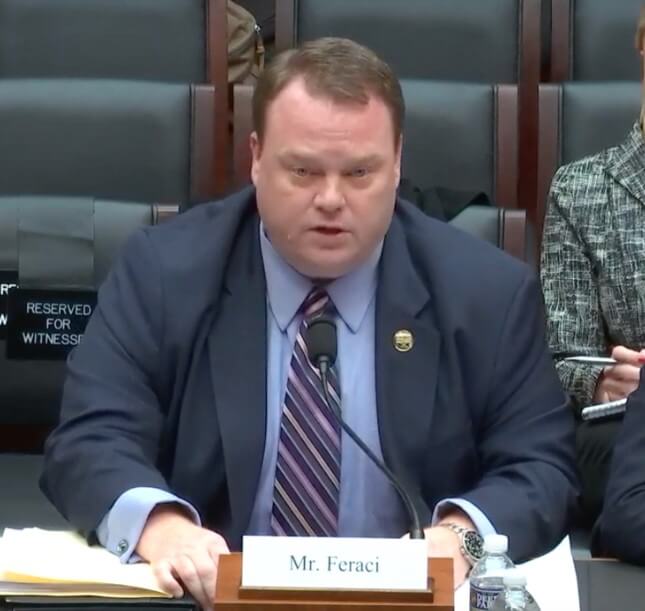On Tuesday, the House Energy and Commerce Committee’s Subcommittee on the Environment convened a hearing on the 21st Century Transportation Fuels Act, a discussion draft led by U.S. Reps. John Shimkus, R-Ill., and Bill Flores, R-Texas, to reshape federal transportation fuel policies.
Notably, the hearing discussed the future of the Renewable Fuel Standard (RFS) program.
“Since the RFS was first established in 2005 and expanded in 2007, much has changed in the market for transportation fuels. If federal policies are not routinely evaluated and updated to reflect market conditions, consumers end up having less than optimal choices,” said Flores.
Last month, the U.S. Environmental Protection Agency finalized a rule that establishes the required renewable fuel volumes under the RFS program for 2019, as well as biomass-based diesel for 2020.
At Tuesday’s hearing, Geoff Cooper, president and CEO of the Renewable Fuels Association (RFA), provided testimony that focused on the need to extend RFS requirements beyond what has been proposed in the 21st Century Transportation Fuels Act discussion draft.
“By eliminating the Renewable Fuel Standard requirements for conventional biofuels in 2022 and adopting a no-growth methodology for advanced and cellulosic biofuel requirements through 2032, the draft bill would undermine the considerable progress our nation has made toward greater energy security, economic vitality, and environmental health,” Cooper said.
“We believe the RFS has been a remarkable success. It has lowered consumer fuel prices, decreased reliance on imported petroleum, reduced emissions of harmful tailpipe pollutants and greenhouse gases, supported hundreds of thousands of jobs in rural America, and added value to the crops produced by our nation’s farmers,” he continued. “The RFS does not end in 2022, and with proper oversight and implementation, the program will continue to drive innovation, support rural economies, and provide cleaner and more affordable fuel choices at the pump. We simply cannot support eliminating the RFS program, as the draft envisions, without a much stronger signal to the market that ethanol’s role in our fuel supply will continue to grow.”
Further, Michael McAdams, president of the Advanced Biofuels Association, noted that the group “supports this committee’s efforts to reform the RFS.”
“We believe that comprehensive reform will actualize the vision for advanced renewable fuels that this committee and Congress as a whole overwhelmingly supported when it passed the RFS in 2007.”
He explained, “With the transportation sector now the greatest contributor to U.S. greenhouse-gas emissions, and with the volume of air traffic doubling every 15 years, we need to ensure that we have a sufficient supply of alternative, low-carbon fuels.”
However, he noted that there are still “numerous barriers to entry under the current RFS program that specifically disadvantage these innovative fuels of the future.”
A potential reform, according to McAdams, would be to “take politics out of the equation as much as possible by making the RFS a rules-based system.”
“For example,” he explained, “we support legislative provisions that would base the annual [renewable volume obligation] on the previous year’s actual production, queuing up mid-year and end-of-year adjustments to account for increases or decreases in production.”
Manning Feraci of the Coalition for Renewable Natural Gas (RNG Coalition) also provided testimony on behalf of the renewable natural gas (RNG) industry.
At the outset of his testimony, Feraci noted that RNG currently fuels more than 25% of the nation’s medium- and heavy-duty natural gas vehicles and represents more than 95% of the renewable fuel used to meet the RFS program’s cellulosic biofuel requirements.
“Renewable natural gas is an environmentally friendly fuel that reduces lifecycle emissions by 80 percent or more compared to conventional petroleum diesel,” he said.
Feraci’s testimony noted the importance of long-term certainty for advanced and cellulosic biofuels under the RFS program to the nation’s increased production of clean fuels, to domestic fuel and energy security, and to achieving decreased greenhouse-gas emissions over the long term.
“A long-term RFS program is a vital component of a policy framework that attracts the investment and deployment of capital needed to increase the production and use of clean advanced biofuels like RNG,” he said. “RNG projects require significant capital investment… They often involve 20-year off-take agreements with feedstock providers.”
He testified that cellulosic biofuels industry entrepreneurs, business owners, financiers and marketers have invested over a billion dollars in response to Congress’ enacting the RFS program. Feraci noted that since 2011 with the RFS framework, the RNG industry has developed over 45 production facilities capable of producing high-Btu gas that can be used for transportation applications, with over 50 projects under construction or consideration.
“As a result of the RFS, we have a growing, vibrant domestic industry that is converting waste into a domestically produced cellulosic biofuel that can be readily incorporated into our existing infrastructure and be utilized by natural gas vehicles. Further, this is being done in a way that reduces harmful emissions. This is a win-win scenario.”
A video of the hearing, along with all written testimonies, can be found here.






